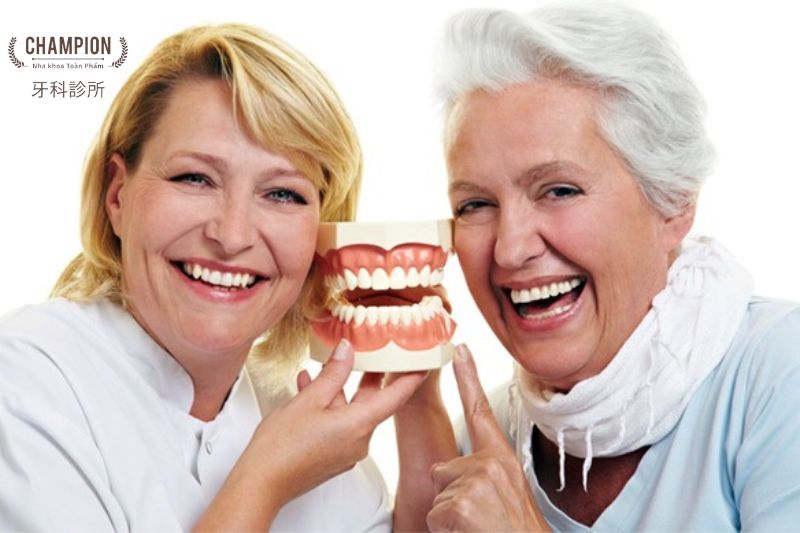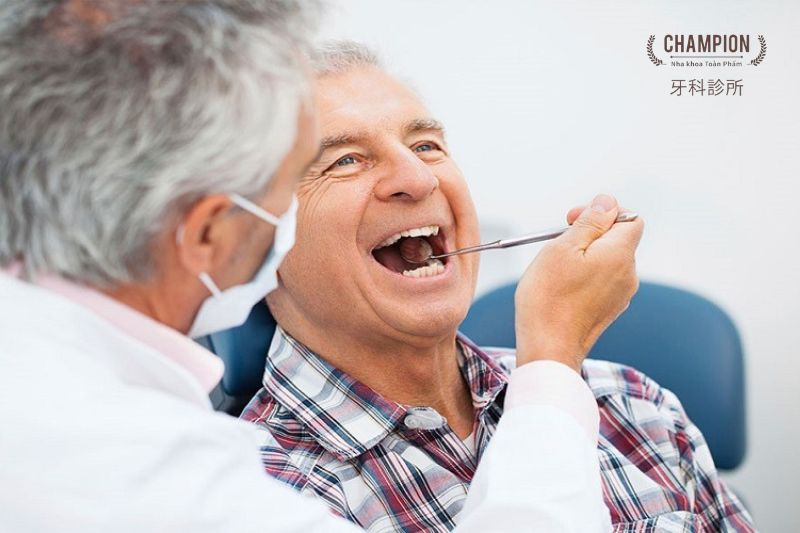The aging process can lead to tooth loss for the elderly, significantly affecting the structure of the jaw and chewing function. In such cases, dental implants are considered one of the methods to restore teeth and ensure proper chewing functions. So what are the best methods of dental implantation for the elderly? Read the article below by Champion Dental Clinic.
Should dentures be implanted for the elderly?
For older individuals entering the aging phase, their bodies often experience a decline in overall health and various health conditions. Among these, oral health issues become increasingly complex. Teeth can become sensitive, loose, and prone to breakage. If the gaps caused by tooth loss are left untreated, serious consequences can occur.
- Decreased chewing function: The elderly may experience difficulties in chewing activities if they have missing teeth, leading to inadequate nutrition and declining health.
- Jaw misalignment: When teeth are lost, gaps are created, causing the remaining teeth to shift from their original positions, resulting in misaligned bites and an imbalanced jaw structure.
- Jawbone atrophy: The daily chewing process plays a crucial role in maintaining the functional activity of the jawbone. However, if chewing function is compromised, the jawbone cannot function optimally, leading to bone loss (jawbone resorption).
- Facial aging: Prolonged tooth loss without proper treatment can contribute to jawbone atrophy, causing facial imbalance, sagging skin, sunken cheeks, and more prominent wrinkles, making individuals appear older than their actual age.
- Speech impairment: Tooth loss can also affect the ability of older individuals to pronounce sounds, leading to slurred speech and unclear articulation.
To minimize these complications, it is crucial for the elderly with missing teeth to pursue timely dental restorations to protect their oral health, improve chewing efficiency, and enhance their overall well-being and happiness.

Common dental implant methods for the elderly
Currently, dental implantation for the elderly stands out with the following methods:
Dental implants
Implant-supported dental implants are an advanced and popular method of dental restoration, particularly favored by older individuals, as they have the ability to fully restore the shape and function of teeth. This method involves placing a titanium post into the jawbone to replace the missing tooth root, and then attaching the dental crown to that post.
Advantages
- The ability to restore chewing function up to 90% allows older individuals to eat and drink comfortably and maintain regular jawbone activity, thereby preventing bone resorption.
- Implant-supported dental implants also provide high aesthetic benefits, as they are not easily noticeable to the naked eye.
- The implant post is typically made of premium-grade Titanium material, ensuring safety and compatibility with the body.
- It does not cause invasion or affect the surrounding teeth, thus preserving natural teeth to the maximum extent.
- Implant longevity is high, and with proper care, they can last indefinitely.
- Easy maintenance, avoiding oral-related diseases.
Disadvantages
- Relatively high costs due to the complexity of dental procedures.
- Treatment takes a long time and requires regular monitoring.
Dental bridges
Dental bridges, also known as fixed dental bridges, are a method used to restore missing teeth by utilizing the two adjacent teeth near the missing area as support for the bridge. In this method, a porcelain crown is placed between the supporting teeth to fill the gap left by the missing tooth.
Advantages
- The color of the false tooth is adjusted to match the natural tooth enamel, resulting in high aesthetic appeal.
- Sturdy structure with the ability to withstand chewing forces at a moderate intensity.
- Easy to maintain hygiene.
- Longevity, with proper care, bridges can last for 10 to 20 years.
- Quick treatment time, typically completed within 3 to 5 days.
- Cost-effective compared to other procedures.
Disadvantages
- This method is only feasible when there are at least two healthy and strong teeth adjacent to the missing tooth. The preparation of these supporting teeth for the bridge can weaken the natural teeth, and over time, may lead to further tooth loss.
- Cannot prevent bone resorption and may contribute to facial deformities. As the jawbone gradually diminishes, the supporting teeth may become looser, resulting in limitations in chewing function.
- Improper technique can lead to bad breath.
- Only applicable when the patient has lost one or a few teeth and not suitable for full arch restoration.

Removable dentures
Removable dentures are a traditional method of tooth replacement commonly used for older individuals. This method can be applied to restore one tooth, multiple teeth, or a full set of teeth.
Advantages
- Made from biocompatible and safe materials that do not cause irritation and ensure the user's oral health.
- Can be easily removed and inserted.
- The completion time for the denture process is relatively quick, typically ranging from 2 to 4 days.
- Cost-effective compared to other treatment options.
Disadvantages
- Due to the design and material of the dentures, their chewing force may be weaker compared to natural teeth, restoring only around 30-40% of the chewing ability. This limits the ability to chew hard, tough, and sticky foods.
- Does not provide the same level of stability as natural teeth and carries the risk of falling out during use.
- Cannot prevent bone resorption.
- Due to the lack of a complete seal with the underlying gums, removable dentures can cause bad breath. Regular removal and cleaning are necessary to maintain oral hygiene.
- The aesthetic appeal is low, making the dentures easily noticeable.

The Best Method of Denture Implantation for the Elderly
Currently, dental implantation is considered the optimal method for tooth restoration, as it ensures equivalent chewing function to natural teeth and prevents complications such as jaw bone resorption. In particular, dental implants only need to be implanted once and can be used for a lifetime, providing comfort in eating and enjoying old age for elderly individuals.
For older adults, maintaining good oral health is highly important. Therefore, when there is a need for tooth restoration, choosing dental implantation is a wise decision to ensure the best chewing function and lifelong use of the implants.
>> See more: How Soon After Dental Implants Can Eat Normally?
Champion Dental Clinic - The Leading Specialized Dental Center in Vietnam
Champion Dental Clinic is a reliable choice for many customers of all ages. We take pride in our team of highly skilled dentists with over 10 years of experience in dental implantation. Our team of dentists continuously improves their professional skills through internships in leading foreign countries.
As of now, Champion Dental Clinic has successfully performed thousands of tooth loss cases, ranging from mild to severe. We have provided nearly perfect chewing ability for our customers through the dental implantation method. Champion Dental Clinic is committed to providing quality and reliable dental restoration solutions, enabling customers to enjoy life with confident smiles and perfect chewing function.
The article above presents some of the most popular denture implantation methods for the elderly, among which dental implants are highly favored. Champion Dental Clinic is always ready to provide you with strong and healthy teeth and a confident smile.
Vietnamese & English: (028) 5411-2295
中文: (028) 5411-2297 172 Nguyen Luong Bang, Tan Phu Ward, District 7, Ho Chi Minh City.
Fanpage: Champion Dental Clinic 牙科診所
Zalo: Champion Dental Clinic
Youtube: Champion Dental Clinic 牙科診所
 Champion Dental Clinic
Champion Dental Clinic



